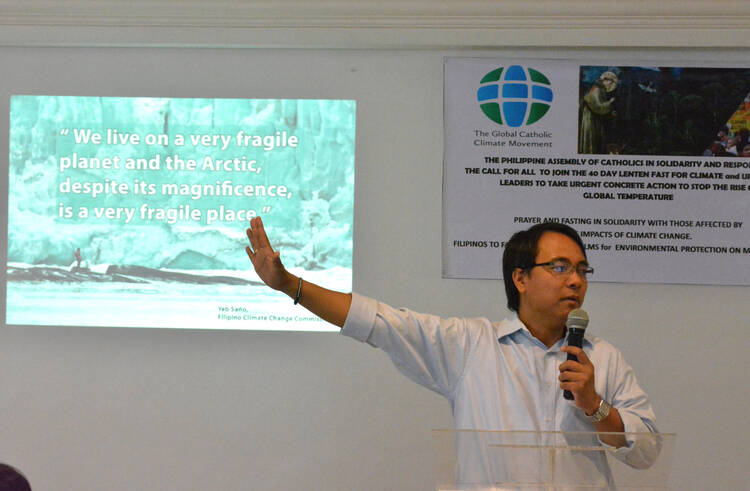Right now, at least 1,000 Catholics are taking part in the Lenten Fast for Climate Justice, a roving global fast that reaches the United States today. It is being organized by the Global Catholic Climate Movement, a new initiative that has mobilized fasts this Lenten season in 56 countries.
“The fast is going very well,” says Patrick Carolan of the Franciscan Action Network, one of the fast’s organizers. “I’m real hungry.” He is in Washington, D.C., to participate in a prayer vigil in Upper Senate Park, near the offices of the U.S. Senate.
“Climate change is the greatest environmental and ecological challenge we face over the next century,” says Rep. Rosa DeLauro, of Connecticut, in a Franciscan Action Network press release. “For centuries fasts have served as important acts of personal and community conscious raising. This fast reminds us that we have a duty to be stewards to preserve and restore our world.”
The connection between fasting and climate is not accidental. The World Food Programme estimates that climate change increases the risk of hunger by between 10 and 20 percent in the coming decades. And according to Oxfam UK’s Robin Willoughby, quoted in the Guardian, “Climate change is already making people hungry.” In Kenya, for instance, a climate-related drought has prompted local Catholic leaders to make 3,000 acres of church-owned land available for farming to boost the country’s food reserves.
Mr. Carolan says he has been reflecting on chapter 58 in the Book of Isaiah, which considers what kind of fast is pleasing to God. “Is it not sharing your bread with the hungry?” the prophet asks.
2015 is poised to be a historic year in the decades-long struggle to confront climate change and transform the carbon-addicted global economy. This summer, Pope Francis is expected to promulgate an encyclical on environmental stewardship, timed to precede the United Nations’ COP 21 meeting this November and December in Paris. The meeting’s purpose is to produce a binding global agreement on steps to stem the causes and reduce the impact of climate change.
Americans are growing increasingly concerned about the climate. One recent poll found that 74 percent advocate strong federal action against climate change. And Catholics appear to be leading the way. According to a new study by the Yale Project on Climate Change Communication and the George Mason University Center for Climate Change Communication, Catholics are more concerned about climate change than both Americans in general and non-Catholic Christians. It found, further, that 69 percent of Catholics would advocate increasing our reliance on renewable energy, even if it cost the average household an extra $100 per year.
At the level of government, however, progress has been slow. President Obama has sought to advance climate policy by executive order and diplomacy, and he has vetoed the effort by Republicans in Congress, backed by allies in the fossil-fuels industry, to speed the approval of the Keystone XL pipeline, which climate activists have called a “carbon bomb.” Democrats, while being quicker to recognize the reality of climate change, have also been slow to make it a policy priority.
The political deadlock has inspired a group called Interfaith Action on Climate Change to call a demonstration on March 22 in New York called “Moving America from Carbon Pharaohs to Democracy”—with language fit for the Passover season, when Jews celebrate their liberation from the rulers of Egypt.
To fast is to insist that there is a choice when there appears to be none. It is volition against hopelessness, life against inevitable death. People turn to fasting in moments when nothing else seems to work, when the system is broken and their voices aren’t being heard. For prisoners who have no other rights, from Guantánamo to Pelican Bay, renouncing food is a way of asserting their basic dignity. In her study of medieval women, Holy Feast and Holy Fast, historian Caroline Walker Bynum argued, “Women’s food practices frequently enabled them to determine the shape of their lives.” At the same time, she wrote, “they were ways of fusing with a Christ whose suffering saves the world.” Gandhi, and Cesar Chavez, have used fasting as an effective method of nonviolent struggle, although a personally challenging one. Fasting is not new to the climate movement, either. During the 2013 U.N. climate meeting in Warsaw, Philippine climate negotiator Yeb Sano undertook a fast to demand meaningful action.
That action has yet to come, but today’s fast is one more step toward the day when it will.








